The Free Mexican Airforce
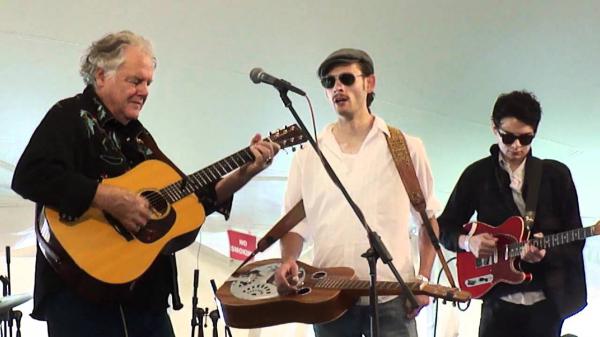
In the Morenos Mountains campesinos are planting their fields
(continuer)
(continuer)
envoyé par Piersante Sestini 21/2/2016 - 12:52
Bottiglie e battaglie
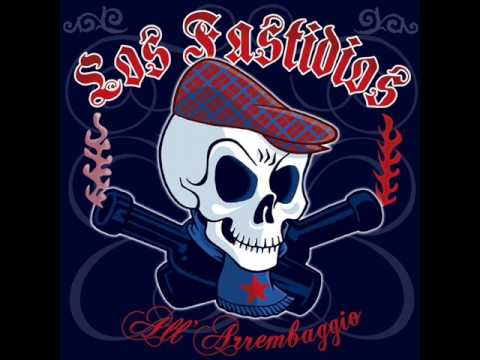
Ogni volta che soffia quel vento mi tornano in mente le vecchie canzoni
(continuer)
(continuer)
envoyé par Luca 'The River' 20/2/2016 - 17:18
Attenti al leghista!
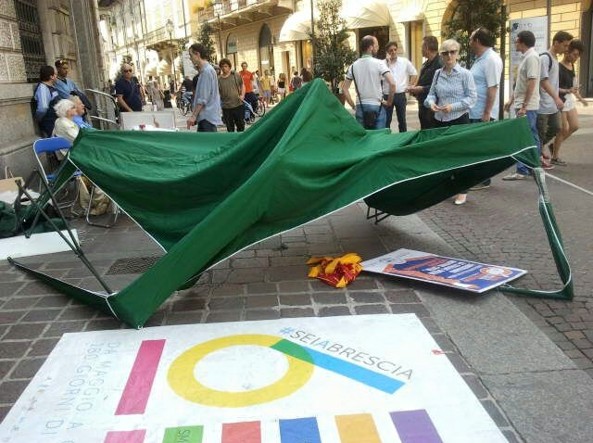
[20 febbraio 2016]
Sull'aria (ovviamente)
del Gorille di Georges Brassens
(o del Gorilla di Fabrizio De André)
Sull'aria (ovviamente)
del Gorille di Georges Brassens
(o del Gorilla di Fabrizio De André)
Sulla piazza di una città
(continuer)
(continuer)
20/2/2016 - 09:34
Cayenne
anonyme
Cayenne
Chanson française – Cayenne – anonyme – vers 1900.
Interprétation : Parabellum
Cette chanson anarchiste des environs de 1900 souvent chantée au bagne de Cayenne, souvent attribuée à Bruant. Elle fut reprise avec succès par le groupe de rock Parabellum en 1986, mais le dernier couplet a volontairement été omis par le parolier de l'époque. Puis par Les Amis d'ta femme, en 2000. Ces derniers donneront une alternative au refrain à la fin de la chanson. Opium du peuple a fait une reprise de la version de Parabellum en 2014 ; version intégrée sur l'album La revanche des clones en 2015.
Elle est parfois également interprétée par Sanseverino lors de ses concerts, de même pour le groupe "Le grôs tour".
Le dialogue maïeutique avec l'âne
Voici encore, Lucien l'âne mon ami, une chanson à propos de Cayenne, ce terrible bagne que la France entretînt en Guyane jusqu'en 1946 ; du moins,... (continuer)
Chanson française – Cayenne – anonyme – vers 1900.
Interprétation : Parabellum
Cette chanson anarchiste des environs de 1900 souvent chantée au bagne de Cayenne, souvent attribuée à Bruant. Elle fut reprise avec succès par le groupe de rock Parabellum en 1986, mais le dernier couplet a volontairement été omis par le parolier de l'époque. Puis par Les Amis d'ta femme, en 2000. Ces derniers donneront une alternative au refrain à la fin de la chanson. Opium du peuple a fait une reprise de la version de Parabellum en 2014 ; version intégrée sur l'album La revanche des clones en 2015.
Elle est parfois également interprétée par Sanseverino lors de ses concerts, de même pour le groupe "Le grôs tour".
Le dialogue maïeutique avec l'âne
Voici encore, Lucien l'âne mon ami, une chanson à propos de Cayenne, ce terrible bagne que la France entretînt en Guyane jusqu'en 1946 ; du moins,... (continuer)
Je me souviens encore de ma première femme ;
(continuer)
(continuer)
envoyé par Marco Valdo M.I. 19/2/2016 - 22:37
Il giorno prima

(1984)
Album: "Aloha"
Album: "Aloha"
Può accadere senza che la sveglia suoni, a metà di un sogno o un tiro di pallone
(continuer)
(continuer)
envoyé par Lucia Pergher 19/2/2016 - 20:28
Parcours:
Contre le Nucléaire
Dall'altra parte

Album: "Il colore dei pensieri" (1987)
La descrizione malinconica di come si vive nei paesi del Patto di Varsavia porta l'ascoltatore a commuoversi e a riflettere sulle note di Dall'altra parte, brano conclusivo dell'album, che si apre con una introduzione al pianoforte molto malinconica, che lo stesso Facchinetti ammette di aver mutuato da una composizione sentita quasi un decennio prima durante un soggiorno in Romania in occasione della loro tournée nei paesi dell'Est Europa.
La descrizione malinconica di come si vive nei paesi del Patto di Varsavia porta l'ascoltatore a commuoversi e a riflettere sulle note di Dall'altra parte, brano conclusivo dell'album, che si apre con una introduzione al pianoforte molto malinconica, che lo stesso Facchinetti ammette di aver mutuato da una composizione sentita quasi un decennio prima durante un soggiorno in Romania in occasione della loro tournée nei paesi dell'Est Europa.
Dall'altra parte fanno estate i girasoli
(continuer)
(continuer)
envoyé par Lucia Pergher 19/2/2016 - 20:25
Les Bambous
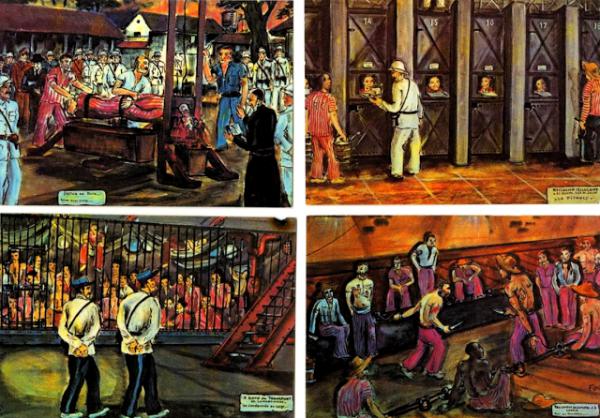
Les Bambous
Chanson française – Les Bambous – Maurice Dulac – 1970
Texte : Boris Bergman (interprétation 1974 – Album : Le Tzigane et la fourmi)
Musique : Maurice Dulac
Lucien l’âne mon ami, toi qui es foncièrement herbivore, tu auras certainement souvenance de la chanson de Karel Kryl que j’avais mise en langue française l’autre jour et qui s’intitule HERBE [(Tráva).
Bien évidemment que je m’en souviens. C’était il y a deux ou trois jours. Je ne suis quand même pas gâteux malgré mon âge millénaire. Mais comme tu le sais, vivre en écriture, ça conserve. Dans cette chanson, il était question de la guerre du Vietnam et de bambous.
Précisément. Et à propos de bambous encore, au moment où je transcrivais cette version française d’une chanson tchèque, s’est mis à me trottiner dans la tête un air entendu autrefois. C’était la ritournelle d’une chanson où il était question de bambous et... (continuer)
Chanson française – Les Bambous – Maurice Dulac – 1970
Texte : Boris Bergman (interprétation 1974 – Album : Le Tzigane et la fourmi)
Musique : Maurice Dulac
Lucien l’âne mon ami, toi qui es foncièrement herbivore, tu auras certainement souvenance de la chanson de Karel Kryl que j’avais mise en langue française l’autre jour et qui s’intitule HERBE [(Tráva).
Bien évidemment que je m’en souviens. C’était il y a deux ou trois jours. Je ne suis quand même pas gâteux malgré mon âge millénaire. Mais comme tu le sais, vivre en écriture, ça conserve. Dans cette chanson, il était question de la guerre du Vietnam et de bambous.
Précisément. Et à propos de bambous encore, au moment où je transcrivais cette version française d’une chanson tchèque, s’est mis à me trottiner dans la tête un air entendu autrefois. C’était la ritournelle d’une chanson où il était question de bambous et... (continuer)
Tu dors sous les bambous, les bambous, les bambous,
(continuer)
(continuer)
envoyé par Marco Valdo M.I. 18/2/2016 - 21:46
Parcours:
Des prisons du monde
The Unknown Soldier
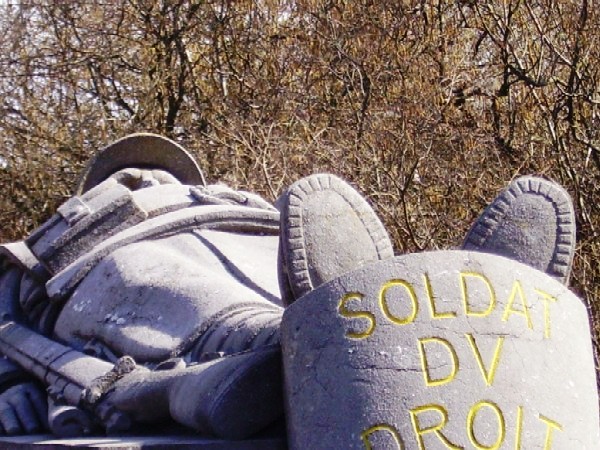
[1980]
Parole e musica di Roy Harper
La traccia che dà il titolo (e la copertina) all’album
Una canzone nata dopo una visita a Verdun…
Negli ultimi versi, un’attualizzazione: il soldato morto sui campi della Grande Guerra veglia sul sonno e sui sogni degli innocenti, dei bambini, e insieme a loro andrà a fare a pezzi il bastardo che tiene il dito sul pulsante che può scatenare la guerra finale, quella nucleare…
[…] Perhaps the most remarkable moment in the history of the making of this record was the trip I made with Adrian Boot, later to photograph Bob Marley so completely, to the battlefield at Verdun in France to take the pictures for the sleeve. Pete (Jenner) had just read a book called- 'The Price Of Glory' Verdun 1916, by Alistair Horne, and he suggested Verdun as an idea. I seized on the idea immediately and Adrian and I were soon disembarking at Boulogne in an undrivable hired... (continuer)
Parole e musica di Roy Harper
La traccia che dà il titolo (e la copertina) all’album
Una canzone nata dopo una visita a Verdun…
Negli ultimi versi, un’attualizzazione: il soldato morto sui campi della Grande Guerra veglia sul sonno e sui sogni degli innocenti, dei bambini, e insieme a loro andrà a fare a pezzi il bastardo che tiene il dito sul pulsante che può scatenare la guerra finale, quella nucleare…
[…] Perhaps the most remarkable moment in the history of the making of this record was the trip I made with Adrian Boot, later to photograph Bob Marley so completely, to the battlefield at Verdun in France to take the pictures for the sleeve. Pete (Jenner) had just read a book called- 'The Price Of Glory' Verdun 1916, by Alistair Horne, and he suggested Verdun as an idea. I seized on the idea immediately and Adrian and I were soon disembarking at Boulogne in an undrivable hired... (continuer)
I am an old soldier
(continuer)
(continuer)
envoyé par Bernart Bartleby 18/2/2016 - 15:45
Le cul entre deux chaises
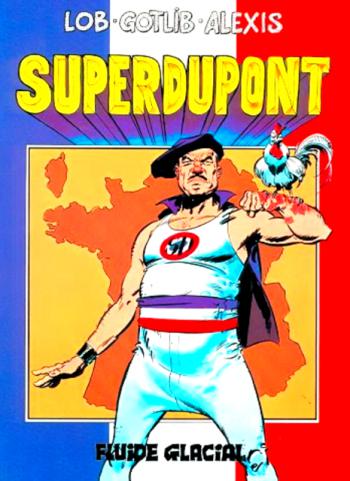
Le cul entre deux chaises
Chanson française – Le cul entre deux chaises – Maurice Dulac – 1975
Texte : Jacqueline Sorano – Maurice Dulac
Il y a des chansons et en corollaire, des chanteurs et même, des chanteuses de ces chansons qu’on découvre bien longtemps après le moment de leur floraison et même qu’ils aient fini de la chanter. Mais, te souviens-tu précisément, de ceci :
« Longtemps, longtemps après que les poètes ont disparu,
Leurs chansons courent encore dans les rues. », que disait, chantonnait Trenet. C’est le cas de cette chanson de Jacqueline Sorano, interprétée par Maurice Dulac en 1975. Elle s’intitule « Le cul entre deux chaises », mais, à voir ton œil égrillard, je te précise tout de suite ce n’est pas le cul de la patronne.
Là Marco Valdo M.I. mon ami, je t’arrête. C’est dommage, car comme tu le devines, j’aime beaucoup le cul de la patronne, c’est toujours pour moi,... (continuer)
Chanson française – Le cul entre deux chaises – Maurice Dulac – 1975
Texte : Jacqueline Sorano – Maurice Dulac
Il y a des chansons et en corollaire, des chanteurs et même, des chanteuses de ces chansons qu’on découvre bien longtemps après le moment de leur floraison et même qu’ils aient fini de la chanter. Mais, te souviens-tu précisément, de ceci :
« Longtemps, longtemps après que les poètes ont disparu,
Leurs chansons courent encore dans les rues. », que disait, chantonnait Trenet. C’est le cas de cette chanson de Jacqueline Sorano, interprétée par Maurice Dulac en 1975. Elle s’intitule « Le cul entre deux chaises », mais, à voir ton œil égrillard, je te précise tout de suite ce n’est pas le cul de la patronne.
Là Marco Valdo M.I. mon ami, je t’arrête. C’est dommage, car comme tu le devines, j’aime beaucoup le cul de la patronne, c’est toujours pour moi,... (continuer)
Je suis né sous le signe de la balance,
(continuer)
(continuer)
envoyé par Marco Valdo M.I. 17/2/2016 - 23:26
A Good Man Is Hard to Find (Pittsburgh)

(1982)
Registrata durante le sessioni di Born in the U.S.A. e pubblicata in seguito in Tracks (1998)
Bruce Springsteen told Mark Hagen in an interview published in Mojo Magazine in January 1999: "The late '70s and early '80s was the first time when literature and films began to be made about Vietnam. There was a subtext on a few earlier things, there was a movie called 'Who'll Stop The Rain' with Nick Nolte, but all of a sudden it began to become very directly addressed. It began with a strange experience when I was driving across the country and I stopped in Arizona at a chug store and I bought a book called 'Born On The Fourth Of July'. I drove on to Los Angeles, and was at this little motel sitting at the pool and a fella came up, started talking and introduced himself: Ron Kovic. I thought, I must have met this fella, his name sounds real familiar, and he said, 'I wrote a book called... (continuer)
Registrata durante le sessioni di Born in the U.S.A. e pubblicata in seguito in Tracks (1998)
Bruce Springsteen told Mark Hagen in an interview published in Mojo Magazine in January 1999: "The late '70s and early '80s was the first time when literature and films began to be made about Vietnam. There was a subtext on a few earlier things, there was a movie called 'Who'll Stop The Rain' with Nick Nolte, but all of a sudden it began to become very directly addressed. It began with a strange experience when I was driving across the country and I stopped in Arizona at a chug store and I bought a book called 'Born On The Fourth Of July'. I drove on to Los Angeles, and was at this little motel sitting at the pool and a fella came up, started talking and introduced himself: Ron Kovic. I thought, I must have met this fella, his name sounds real familiar, and he said, 'I wrote a book called... (continuer)
It's cloudy out in Pittsburgh, it's raining in Saigon
(continuer)
(continuer)
17/2/2016 - 22:24
Parcours:
Guerre au Vietnam: vue des USA
Hand-Loom Weaver’s Lament

[1820s]
Testo scritto da John Grimshaw, tale dei dintorni di Manchester di cui non mi pare ci siano tracce precise nella Rete.
Sicchè l’ho attibuita ad Harry Boardman (1930–1987), folksinger del Lancashire, che nel 1964 la incise (con il titolo “The Hand-Loom Versus The Power-Loom) nel disco collettivo intitolato “New Voices”, con Maureen Craik e The Waterson Family
Sulla melodia della popolare “A-Hunting We Will Go”
Handloom weavers were generally poor but at least they had a measure of independence, whether they were itinerate or working at home in their own cottages. But with the coming of the Industrial Revolution and the machine-looms, their independence went and they had to crowd into factories under the eye of the overseer. This song relates to the period towards the end of the eighteenth century when the switchover from hand-weaving to power-weaving was taking place. It's printed... (continuer)
Testo scritto da John Grimshaw, tale dei dintorni di Manchester di cui non mi pare ci siano tracce precise nella Rete.
Sicchè l’ho attibuita ad Harry Boardman (1930–1987), folksinger del Lancashire, che nel 1964 la incise (con il titolo “The Hand-Loom Versus The Power-Loom) nel disco collettivo intitolato “New Voices”, con Maureen Craik e The Waterson Family
Sulla melodia della popolare “A-Hunting We Will Go”
Handloom weavers were generally poor but at least they had a measure of independence, whether they were itinerate or working at home in their own cottages. But with the coming of the Industrial Revolution and the machine-looms, their independence went and they had to crowd into factories under the eye of the overseer. This song relates to the period towards the end of the eighteenth century when the switchover from hand-weaving to power-weaving was taking place. It's printed... (continuer)
You gentlemen and tradesmen that ride about at will,
(continuer)
(continuer)
envoyé par Bernart Bartleby 17/2/2016 - 11:48
Farewell Address
anonyme
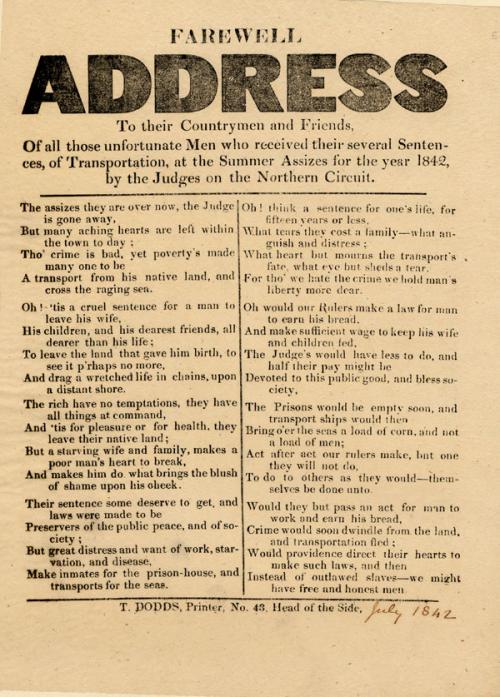
[1842]
Ballata di anonimo autore inglese raccolta da John Bell, ricercatore folklorico e bibliotecario in Newcastle
Nel primo volume di una raccolta di broadsides conservata presso gli archivi dell’Università di Newcastle upon Tyne, Inghilterra.
Testo trovato sul sito del FARNE, Folk Archive Resource North East
Lament on the transportation of criminals to the colonies.
At the time this song was printed, the British penal code was extremely harsh. In the late eighteenth century Parliament had dramatically increased the number of capital offences and it was said that there were more executions annually in England than in all the rest of Europe. In Newcastle until well on into the second quarter of the nineteenth century, prisoners were hanged at Morpeth, Durham and Newcastle, before a great crowd of spectators, it being usual practice at Newcastle to hand over the body afterwards to the... (continuer)
Ballata di anonimo autore inglese raccolta da John Bell, ricercatore folklorico e bibliotecario in Newcastle
Nel primo volume di una raccolta di broadsides conservata presso gli archivi dell’Università di Newcastle upon Tyne, Inghilterra.
Testo trovato sul sito del FARNE, Folk Archive Resource North East
Lament on the transportation of criminals to the colonies.
At the time this song was printed, the British penal code was extremely harsh. In the late eighteenth century Parliament had dramatically increased the number of capital offences and it was said that there were more executions annually in England than in all the rest of Europe. In Newcastle until well on into the second quarter of the nineteenth century, prisoners were hanged at Morpeth, Durham and Newcastle, before a great crowd of spectators, it being usual practice at Newcastle to hand over the body afterwards to the... (continuer)
To their countrymen and friends, of all those unfortunate men who received their several sentences of transportation, at the Summer Assizes for the year 1842, by the judges on the Northern Circuit.
(continuer)
(continuer)
envoyé par Bernart Bartleby 17/2/2016 - 10:34
Truth Is

[2011]
Parole e musica di Gary Shearston (1939-2013), cantautore australiano.
Nell’album intitolato “Renegade”
Testo trovato sul sito dell’autore
Gary Shearston è morto nel 2013, ma ha avuto ancora tempo di realizzare quattro album dopo questo “Renegade”, dove il rinnegato è lui stesso che fa un bilancio della sua vita, un’esistenza piuttosto movimentata. Essere cantautore negli anni 60 – in Australia, come negli USA, come in Italia – significava spesso dare voce a delle istanze politiche, e anche Gary Shearston lo fece, schierandosi apertamente contro la guerra in Vietnam e la partecipazione dell’Australia a quell’aggressione americana, partecipando alle campagne in difese dei diritti degli aborigeni, prendendo posizione in favore del disarmo nucleare… Per queste sue posizioni Gary Shearston – che oltre tutto non aveva a difenderlo la notorietà di un John Lennon – pagò un prezzo piuttosto... (continuer)
Parole e musica di Gary Shearston (1939-2013), cantautore australiano.
Nell’album intitolato “Renegade”
Testo trovato sul sito dell’autore
Gary Shearston è morto nel 2013, ma ha avuto ancora tempo di realizzare quattro album dopo questo “Renegade”, dove il rinnegato è lui stesso che fa un bilancio della sua vita, un’esistenza piuttosto movimentata. Essere cantautore negli anni 60 – in Australia, come negli USA, come in Italia – significava spesso dare voce a delle istanze politiche, e anche Gary Shearston lo fece, schierandosi apertamente contro la guerra in Vietnam e la partecipazione dell’Australia a quell’aggressione americana, partecipando alle campagne in difese dei diritti degli aborigeni, prendendo posizione in favore del disarmo nucleare… Per queste sue posizioni Gary Shearston – che oltre tutto non aveva a difenderlo la notorietà di un John Lennon – pagò un prezzo piuttosto... (continuer)
For a while, I forgot who I was,
(continuer)
(continuer)
envoyé par Bernart Bartleby 17/2/2016 - 09:33
Ballad of William White
[1966]
Parole di Katherine Faith Macky (1921-2006), conosciuta come Willow Macky, cantautrice neozelandese
Sulla melodia dell’ottocentesca The Wild Colonial Boy
Canzone inclusa nella prima edizione del “The Vietnam Songbook”, realizzata nel 1969 da Barbara Dane ed Irwin Silber (1925-2010), editore, scrittore, militante socialista e cofondatore “Sing Out!”
Testo trovato sul sito Raymond’s Folk Song Page curato da Raymond Crooke, che di ogni canzone offre anche una sua cover. Pure l’introduzione che segue è sua:
A few days ago I put up a song called "The Ballad of Bill White", by Glen Tomasetti, about an Australian teacher who was jailed as a conscientious objector to the Vietnam war. This is another song about the same story, written by a New Zealander, to the tune of "The Wild Colonial Boy", and published in Barbara Dane's and Irwin Silber's "The Vietnam Songbook" (1969). Macky is quoted... (continuer)
Parole di Katherine Faith Macky (1921-2006), conosciuta come Willow Macky, cantautrice neozelandese
Sulla melodia dell’ottocentesca The Wild Colonial Boy
Canzone inclusa nella prima edizione del “The Vietnam Songbook”, realizzata nel 1969 da Barbara Dane ed Irwin Silber (1925-2010), editore, scrittore, militante socialista e cofondatore “Sing Out!”
Testo trovato sul sito Raymond’s Folk Song Page curato da Raymond Crooke, che di ogni canzone offre anche una sua cover. Pure l’introduzione che segue è sua:
A few days ago I put up a song called "The Ballad of Bill White", by Glen Tomasetti, about an Australian teacher who was jailed as a conscientious objector to the Vietnam war. This is another song about the same story, written by a New Zealander, to the tune of "The Wild Colonial Boy", and published in Barbara Dane's and Irwin Silber's "The Vietnam Songbook" (1969). Macky is quoted... (continuer)
There was a young Australian boy, his name was William White.
(continuer)
(continuer)
envoyé par Bernart Bartleby 16/2/2016 - 15:54
The Ballad of Bill White
[1968]
Parole e musica di Glen Tomasetti (1929-2003)
Il lato A di un 45” di questa oggi misconosciuta cantautrice australiana che negli anni 60 fu - prima ancora di Eric Bogle - la voce più importante contro il coinvolgimento dell’Australia nella guerra in Vietnam.
Testo trascritto da Raymond Crooke e contribuito – insieme alla cover - sul suo bel sito Raymond’s Folk Song Page. Anche l’introduzione che segue è di Raymond Crooke, cui il disco della Tomasetti fu regalato da uno zio quando era ragazzo.
Finora era stato possibile reperire in Rete solo il testo del brano sul lato B, The Army’s Appeal to Mothers
This song was released on an EP during the Vietnam war. The B side featured two songs, the better of which is the hard-hitting "The Army’s Appeal to Mothers", which was published in Barbara Dane's and Irwin Silber's "The Vietnam Songbook" (1969). However, this song, about a teacher... (continuer)
Parole e musica di Glen Tomasetti (1929-2003)
Il lato A di un 45” di questa oggi misconosciuta cantautrice australiana che negli anni 60 fu - prima ancora di Eric Bogle - la voce più importante contro il coinvolgimento dell’Australia nella guerra in Vietnam.
Testo trascritto da Raymond Crooke e contribuito – insieme alla cover - sul suo bel sito Raymond’s Folk Song Page. Anche l’introduzione che segue è di Raymond Crooke, cui il disco della Tomasetti fu regalato da uno zio quando era ragazzo.
Finora era stato possibile reperire in Rete solo il testo del brano sul lato B, The Army’s Appeal to Mothers
This song was released on an EP during the Vietnam war. The B side featured two songs, the better of which is the hard-hitting "The Army’s Appeal to Mothers", which was published in Barbara Dane's and Irwin Silber's "The Vietnam Songbook" (1969). However, this song, about a teacher... (continuer)
In New South Wales there lives a man, a teacher young and true,
(continuer)
(continuer)
envoyé par Bernart Bartleby 16/2/2016 - 15:05
The Conscription Ramp
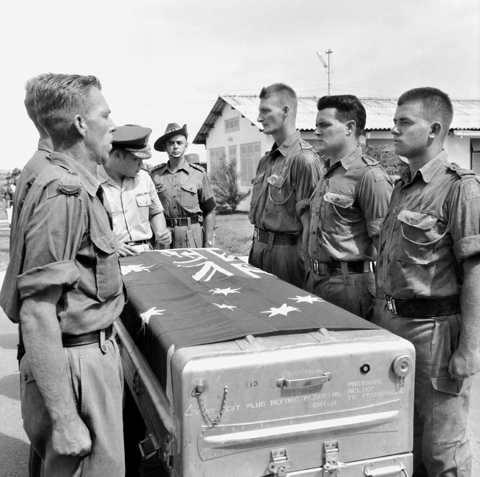
[1966]
Parole di Gary Shearston
La melodia è un adattamento della popolare inglese “The Derby Ram”
Nell’album intitolato “Gary Shearston Sings His Songs”
Testo trovato su YouTube come trascritto dal contributore, Artemis Fowl.
Canzone contro la coscrizione miliare voluta dal governo Australiano per sostenere la guerra americana in Vietnam.
Spesso infatti ci si dimentica che alcuni paesi mandarono in Indocina contingenti di soldati a sostegno degli USA. L’Australia, con 7.000 uomini, fu seconda soltanto alla Corea del Sud (48.000)…
“Perhaps this song, written a week after the announcement of conscription, anticipated the political and moral debates that were to come throughout Australia in following months. The tune is adapted from one of the fairly numerous Australian versions of an English folk song, The Derby Ram.”
(dalle note di copertina riportate sul sito dell’autore)
Parole di Gary Shearston
La melodia è un adattamento della popolare inglese “The Derby Ram”
Nell’album intitolato “Gary Shearston Sings His Songs”
Testo trovato su YouTube come trascritto dal contributore, Artemis Fowl.
Canzone contro la coscrizione miliare voluta dal governo Australiano per sostenere la guerra americana in Vietnam.
Spesso infatti ci si dimentica che alcuni paesi mandarono in Indocina contingenti di soldati a sostegno degli USA. L’Australia, con 7.000 uomini, fu seconda soltanto alla Corea del Sud (48.000)…
“Perhaps this song, written a week after the announcement of conscription, anticipated the political and moral debates that were to come throughout Australia in following months. The tune is adapted from one of the fairly numerous Australian versions of an English folk song, The Derby Ram.”
(dalle note di copertina riportate sul sito dell’autore)
As I was walking down the street while on my twentieth birthday-oh!
(continuer)
(continuer)
envoyé par Bernart Bartleby 16/2/2016 - 14:10
ما عاد بدو

Ma Aad Beddo
[2014]
Scritta da Anas Maghrebi / أنس مغربي
Nell’album d’esordio eponimo di questa formazione di giovani siriani, tutti esuli dal loro paese in guerra.
Testo presente sul sito ufficiale del gruppo ma ripreso da Soundcloud
Nel 2011, all’inizio delle proteste di piazza contro il regime di Assad, Anas Maghrebi aveva già creato una sua band, gli “Ana” (“Io”). Il batterista, Rabia al-Ghazzi, uno che credeva molto nella “primavera” e che aveva partecipato attivamente a molte manifestazioni, un giorno fu seguito da alcuni uomini ed ucciso a sangue freddo, un’esecuzione. Il chitarrista fu chiamato sotto le armi e Anas fu costretto a chiudere col suo progetto, e smise anche di studiare e di lavorare. La Siria stessa, travolta dalla guerra, smise di poter fare qualsiasi cosa se non cercare di sopravvivere, o morire, o uccidere. Anas Maghrebi vide la morte in faccia in un paio... (continuer)
[2014]
Scritta da Anas Maghrebi / أنس مغربي
Nell’album d’esordio eponimo di questa formazione di giovani siriani, tutti esuli dal loro paese in guerra.
Testo presente sul sito ufficiale del gruppo ma ripreso da Soundcloud
Nel 2011, all’inizio delle proteste di piazza contro il regime di Assad, Anas Maghrebi aveva già creato una sua band, gli “Ana” (“Io”). Il batterista, Rabia al-Ghazzi, uno che credeva molto nella “primavera” e che aveva partecipato attivamente a molte manifestazioni, un giorno fu seguito da alcuni uomini ed ucciso a sangue freddo, un’esecuzione. Il chitarrista fu chiamato sotto le armi e Anas fu costretto a chiudere col suo progetto, e smise anche di studiare e di lavorare. La Siria stessa, travolta dalla guerra, smise di poter fare qualsiasi cosa se non cercare di sopravvivere, o morire, o uccidere. Anas Maghrebi vide la morte in faccia in un paio... (continuer)
ما عاد بدو .. هوية
(continuer)
(continuer)
envoyé par Bernart Bartleby 16/2/2016 - 09:41
Parcours:
Exil et exiliés
عايش

Aayesh
[2012]
Scritta da Anas Maghrebi / أنس مغربي
Nell’album d’esordio eponimo di questa formazione di giovani siriani, tutti esuli dal loro paese in guerra.
Testi presenti sul sito ufficiale del gruppo ma ripresi da YouTube e Soundcloud
Nel 2011, all’inizio delle proteste di piazza contro il regime di Assad, Anas Maghrebi aveva già creato una sua band, gli “Ana” (“Io”). Il batterista, Rabia al-Ghazzi, uno che credeva molto nella “primavera” e che aveva partecipato attivamente a molte manifestazioni, un giorno fu seguito da alcuni uomini ed ucciso a sangue freddo, un’esecuzione. Il chitarrista fu chiamato sotto le armi e Anas fu costretto a chiudere col suo progetto, e smise anche di studiare e di lavorare. La Siria stessa, travolta dalla guerra, smise di poter fare qualsiasi cosa se non cercare di sopravvivere, o morire, o uccidere. Anas Maghrebi vide la morte in faccia in un... (continuer)
[2012]
Scritta da Anas Maghrebi / أنس مغربي
Nell’album d’esordio eponimo di questa formazione di giovani siriani, tutti esuli dal loro paese in guerra.
Testi presenti sul sito ufficiale del gruppo ma ripresi da YouTube e Soundcloud
Nel 2011, all’inizio delle proteste di piazza contro il regime di Assad, Anas Maghrebi aveva già creato una sua band, gli “Ana” (“Io”). Il batterista, Rabia al-Ghazzi, uno che credeva molto nella “primavera” e che aveva partecipato attivamente a molte manifestazioni, un giorno fu seguito da alcuni uomini ed ucciso a sangue freddo, un’esecuzione. Il chitarrista fu chiamato sotto le armi e Anas fu costretto a chiudere col suo progetto, e smise anche di studiare e di lavorare. La Siria stessa, travolta dalla guerra, smise di poter fare qualsiasi cosa se non cercare di sopravvivere, o morire, o uccidere. Anas Maghrebi vide la morte in faccia in un... (continuer)
لسّاتك عايش و عم تشرب ميّ
(continuer)
(continuer)
envoyé par Bernart Bartleby 16/2/2016 - 09:05
Parcours:
Exil et exiliés
Coda di Lupo

Dal blog Fabrizio de André in English
Coda di lupo" must be understood in the context of the failure and dissolution of various protest movements in 1976 and 1977, including the Metropolitan Indians, anarchists who wore face paint, dressed like hippies, listened to rock music and enjoyed acid and weed, and who protested bourgeois values through urban guerilla activism, occupying universities, factories, etc.
Rimini grew out of De André's disappointments with the political events of the previous couple of years. In close collaboration with Massimo Bubola, a young 24-year-old who had just released his first album, De André explored several social and political themes, including abortion, homosexuality, and how the petty bourgeois attempted to move into the ranks of the powerful and rise above the political and social turmoil of the times. The music has more influence from American rock and... (continuer)
Coda di lupo" must be understood in the context of the failure and dissolution of various protest movements in 1976 and 1977, including the Metropolitan Indians, anarchists who wore face paint, dressed like hippies, listened to rock music and enjoyed acid and weed, and who protested bourgeois values through urban guerilla activism, occupying universities, factories, etc.
Rimini grew out of De André's disappointments with the political events of the previous couple of years. In close collaboration with Massimo Bubola, a young 24-year-old who had just released his first album, De André explored several social and political themes, including abortion, homosexuality, and how the petty bourgeois attempted to move into the ranks of the powerful and rise above the political and social turmoil of the times. The music has more influence from American rock and... (continuer)
TAIL OF THE WOLF
(continuer)
(continuer)
envoyé par Riccardo Venturi 13/2/2016 - 08:10
The Girl I Left Behind Me
anonyme
L’introduzione inglese al brano è ripresa da Contemplator, o da uno dei tanti siti che lo citano.
Invito a leggere anche l’articolata introduzione di Cattia Salto sul suo sito Terre Celtiche, dove c’è anche la sua traduzione italiana del brano, che riporto:
Invito a leggere anche l’articolata introduzione di Cattia Salto sul suo sito Terre Celtiche, dove c’è anche la sua traduzione italiana del brano, che riporto:
LA RAGAZZA CHE HO LASCIATO DIETRO DI ME
(continuer)
(continuer)
envoyé par Bernart Bartleby 12/2/2016 - 15:12
Stornelli d’esilio
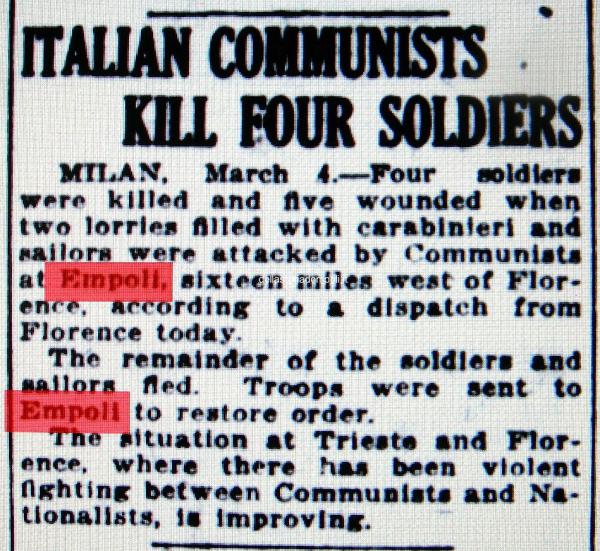
Strofe di anonimi autori antifascisti cantate sulla stessa aria degli “Stornelli d’esilio” di Pietro Gori, di cui è citato il ritornello:
Hanno ammazzato Giovanni Berta
dei fasci fiorentini [o capo degli assassini]
è stato vendicato
Spartaco Lavagnini.
La nostra patria è il mondo intero
la nostra legge è la libertà
e noi viviamo d'un sol pensiero
liberarla l'umanità.
Hanno ammazzato Giovanni Berta
figlio di pescecani
viva quel comunista
che gli pestò le mani!
La nostra patria è il mondo intero
la nostra legge è la libertà
e noi viviamo d'un sol pensiero
liberarla l'umanità.
1921, Annus Horribilis: a Livorno i socialisti si spaccavano e nasceva il Partito Comunista d’Italia; in Germania Adolf Hitler diventava presidente del NSDAP, il Partito Naz(ional-social)ista (dei Lavoratori Tedeschi); a Roma Mussolini fondava il Partito Nazionale Fascista, evoluzione dei Fasci di Combattimento... (continuer)
Hanno ammazzato Giovanni Berta
dei fasci fiorentini [o capo degli assassini]
è stato vendicato
Spartaco Lavagnini.
La nostra patria è il mondo intero
la nostra legge è la libertà
e noi viviamo d'un sol pensiero
liberarla l'umanità.
Hanno ammazzato Giovanni Berta
figlio di pescecani
viva quel comunista
che gli pestò le mani!
La nostra patria è il mondo intero
la nostra legge è la libertà
e noi viviamo d'un sol pensiero
liberarla l'umanità.
1921, Annus Horribilis: a Livorno i socialisti si spaccavano e nasceva il Partito Comunista d’Italia; in Germania Adolf Hitler diventava presidente del NSDAP, il Partito Naz(ional-social)ista (dei Lavoratori Tedeschi); a Roma Mussolini fondava il Partito Nazionale Fascista, evoluzione dei Fasci di Combattimento... (continuer)
Bernart Bartleby 12/2/2016 - 14:24
Quando Bandiera Rossa si cantava
anonyme

Invito a leggere “Quando bandiera rossa si cantava... Ragazzi di Villa Argine condannati per offese al Duce”, di Franco Piccinini, articolo pubblicato su sulla rivista La Piva dal Carner, ottobre 2015, negli atti di un seminario musicale tenutosi ad Orta San Giulio nel 2015.
Racconta di quando una sera del 1936 un gruppo di ragazze e ragazzi di Cadelbosco, località La Rocca, Reggio Emilia, furono sorpresi a cantare “Quando Bandiera Rossa si cantava” da un fascistello locale e da questi denunciati in blocco. Furono tutti condannati “per offese a S.E. il Capo del Governo e grida sediziose” e condannati chi a sei, chi a tre mesi con la condizionale e a svariate centinaia di Lire di multa e ammenda…
Racconta di quando una sera del 1936 un gruppo di ragazze e ragazzi di Cadelbosco, località La Rocca, Reggio Emilia, furono sorpresi a cantare “Quando Bandiera Rossa si cantava” da un fascistello locale e da questi denunciati in blocco. Furono tutti condannati “per offese a S.E. il Capo del Governo e grida sediziose” e condannati chi a sei, chi a tre mesi con la condizionale e a svariate centinaia di Lire di multa e ammenda…
Bernart Bartleby 11/2/2016 - 15:41
Fabrizio De André: Jamin-a

Dal blog Fabrizio De André in English
In De Andrè's words, "Jamína is not a dream, but rather the hope for respite. A respite in the face of possible gale force conditions at sea, or even a shipwreck. I mean that Jamina is the hypothesis of a positive adventure that, in a corner of the fantasy of a sailor, always finds space and respite. Jamina is the companion in an erotic voyage that every sailor hopes for, or better, expects to encounter in every place, after the dangerous broadsides subjected to by an enemy sea or an imprudent commander." - Dennis Criteser
JAMIN-A
(continuer)
(continuer)
envoyé par Riccardo Venturi 11/2/2016 - 07:57
Canzone del padre

Dal blog Fabrizio De André in English
"Per the album notes, the worker "has understood that he is a finished man with no possibility of recovery, that his acts will always be individualistic, striving for his own personal needs, and that by attaining more power one doesn't escape one's condition of isolation and anxiety. The bomb that was tossed with force, with anger and with a sense of vendetta in the dream, now in reality becomes a moment of exhilaration and, obviously of lucidity." - Dennis Criteser
FATHER'S SONG
(continuer)
(continuer)
envoyé par Riccardo Venturi 11/2/2016 - 06:58
Mourir pour des idées

Dal blog Fabrizio De André in English
"Morire per delle idee" is a translation/adaptation of Georges Brassens's "Mourir pour des idées" which was written in response to strong criticism for another of his songs "Les deux oncles," an anti-war song that was controversial because it treated two French brothers equally - one a British sympathizer and the other a collaborationist.
Canzoni, released in 1974, was a "filler" album, like Volume III, desired by De André's label. The only three previously unreleased songs here are covers of Dylan's "Desolation Row" and of two songs by Georges Brassens. Also included are two covers of Leonard Cohen songs.
Canzoni, released in 1974, was a "filler" album, like Volume III, desired by De André's label. The only three previously unreleased songs here are covers of Dylan's "Desolation Row" and of two songs by Georges Brassens. Also included are two covers of Leonard Cohen songs.
DYING FOR SOME IDEAS
(continuer)
(continuer)
envoyé par Riccardo Venturi 11/2/2016 - 05:52
Mourir pour des idées
Attribuita a NTBAHA [sic] e datata 2/11/2014. Appare come una versione letterale dell'originale francese.
ان نموت من اجل افكار
(continuer)
(continuer)
envoyé par Riccardo Venturi 11/2/2016 - 05:45
Mourir pour des idées
Svensk version av Ola Henricsson och Örjan Hjorth.
Att dö för idéer è la versione in lingua svedese (il titolo è l'esatta resa in svedese di quello originale) interpretata da Ola Henricsson e Örjan Hjorth (ma la traduzione è del solo Ola Henricsson). Li vediamo qui interpretarla in uno spettacolo a bordo della nave S/S Marieholm, ormeggiata a Göteborg, il 6 marzo 2015. Il testo non è purtroppo reperibile in rete; ci occuperemo appena possibile di trascriverlo all'ascolto. [RV]
Att dö för idéer è la versione in lingua svedese (il titolo è l'esatta resa in svedese di quello originale) interpretata da Ola Henricsson e Örjan Hjorth (ma la traduzione è del solo Ola Henricsson). Li vediamo qui interpretarla in uno spettacolo a bordo della nave S/S Marieholm, ormeggiata a Göteborg, il 6 marzo 2015. Il testo non è purtroppo reperibile in rete; ci occuperemo appena possibile di trascriverlo all'ascolto. [RV]
envoyé par Riccardo Venturi 11/2/2016 - 04:50
Mourir pour des idées

Ripresa dai sottotitoli del video YouTube sopra proposto, con trascrizione diretta. La variante del portoghese utilizzato è chiaramente brasiliana.
MORRER POR IDEIAS
(continuer)
(continuer)
envoyé par Riccardo Venturi 10/2/2016 - 20:41
La guerra di Piero
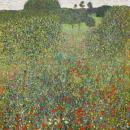
POLACCO / POLISH [2] - Szymon Gruda
Versione polacca cantabile di Szymon Gruda segnalatami da Kaśka Janiak (very cool) [KW]
da questa pagina
Versione polacca cantabile di Szymon Gruda segnalatami da Kaśka Janiak (very cool) [KW]
da questa pagina
PIERO
(continuer)
(continuer)
envoyé par Kaśka Janiak tramite Krzysiek Wrona 10/2/2016 - 19:30
Mourir pour des idées

Dall'album "Suppliche e celebrazioni" (2008).
L'animazione è di Dario Faggella (http://www.faggella.it)
MORIR PER UN'IDEA
(continuer)
(continuer)
envoyé par Riccardo Venturi 10/2/2016 - 18:30
Pe' Stefano
A tutti i poeti manca un verso: ogni tanto anche lo staff di Canzoni Contro la Guerra inciampa su qualche canzone dalla micidiale e irreparabile bruttezza, come questo rap in romanesco imitazione di un originale già esiziale per proprio conto, la cui funesta aura adombra ogni pur lodevole intenzione...
Io non sto con Oriana 10/2/2016 - 16:29
Fabrizio De André: Monti di Mola

Dal blog Fabrizio De André in English
"Monti di Mola" takes place on the Emerald Coast of Sardinia. De André called the song a metaphor showing the impossibility of reaching one's dreams in a society that has become bureaucratic and standardized, where the imagination of the culture can't expand to accept "impossible dreams" that are on the verge of coming true. The song is in the Gallurese dialect.
It took six years after the tremendous success of Creuza de mä for De André to release his next studio album, Le nuvole (The Clouds). In the meantime, he and Mauro Pagani explored several avenues of musical collaboration which did not come to fruition. De André had this to say about Le nuvole: "I realized that people are just pissed off, and since Le nuvole is a symbol of this dissatisfaction, the transference, the intermediary for this general discontent, I would say that the album was welcomed... (continuer)
"Monti di Mola" takes place on the Emerald Coast of Sardinia. De André called the song a metaphor showing the impossibility of reaching one's dreams in a society that has become bureaucratic and standardized, where the imagination of the culture can't expand to accept "impossible dreams" that are on the verge of coming true. The song is in the Gallurese dialect.
It took six years after the tremendous success of Creuza de mä for De André to release his next studio album, Le nuvole (The Clouds). In the meantime, he and Mauro Pagani explored several avenues of musical collaboration which did not come to fruition. De André had this to say about Le nuvole: "I realized that people are just pissed off, and since Le nuvole is a symbol of this dissatisfaction, the transference, the intermediary for this general discontent, I would say that the album was welcomed... (continuer)
MOUNTAINS OF MOLA
(continuer)
(continuer)
envoyé par Riccardo Venturi 10/2/2016 - 09:55
Sidùn
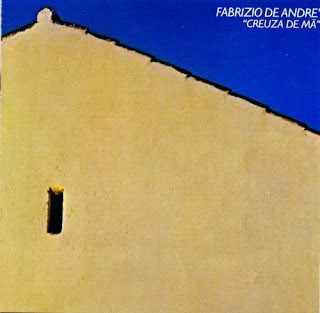
Dal blog Fabrizio De André in English
"Sidon is a coastal city halfway between the southern border of Lebanon and Beirut. At the time this song was written, Lebanon was in the midst of a civil war that began in 1975 and that saw Israel invade and push towards Beirut in 1982. In De André's words, "Sidon is the Lebanese city that gave us, beyond the letters of our alphabet, even the invention of glass. I imagined myself, after the sudden attack of General Sharon in 1982, as a middle-aged Arab man, dirty, desperate, certainly poor, holding in his arms his own son, chewed up by the steel tracks of an armored tank. . . . The 'little death' alluded to at the end of this song should not be confused with the death of a little boy. Rather it is understood metaphorically as the end of a civilization and culture of a small country: Lebanon, Phoenicia, which at its discretion was perhaps the greatest... (continuer)
"Sidon is a coastal city halfway between the southern border of Lebanon and Beirut. At the time this song was written, Lebanon was in the midst of a civil war that began in 1975 and that saw Israel invade and push towards Beirut in 1982. In De André's words, "Sidon is the Lebanese city that gave us, beyond the letters of our alphabet, even the invention of glass. I imagined myself, after the sudden attack of General Sharon in 1982, as a middle-aged Arab man, dirty, desperate, certainly poor, holding in his arms his own son, chewed up by the steel tracks of an armored tank. . . . The 'little death' alluded to at the end of this song should not be confused with the death of a little boy. Rather it is understood metaphorically as the end of a civilization and culture of a small country: Lebanon, Phoenicia, which at its discretion was perhaps the greatest... (continuer)
SIDON
(continuer)
(continuer)
envoyé par Riccardo Venturi 10/2/2016 - 05:58
Nella mia ora di libertà

Dal blog Fabrizio De André in English
"In the final song, the worker realizes that individual protest has little chance of having results against power, and that to change things it's necessary to join with others and to act en masse, as did the students of May 1968 in France." - Dennis Criteser
IN MY HOUR OF FREEDOM
(continuer)
(continuer)
envoyé par Riccardo Venturi 10/2/2016 - 05:23
Ballata degli impiccati

Dal blog Fabrizio De André in English
"La ballata degli impiccati" is closely related to a 1462 poem, "Ballade des pendus" by François Villon, written in prison while waiting for his execution. Whereas Villon asks for pity for the condemned, the lyrics of De Andrè and Bentivoglio express rancor for those who judged, for those who buried, even for those who remembered, all of whom will inevitably also meet their ends.
Tutti morimmo a stento, released in 1968, was one of the first concept albums in Italy. In De Andrè's own words, the album "speaks of death, not of bubble gum death with little bones, but of psychological death, moral death, mental death, that a normal person can encounter during his lifetime." After the success of Volume I, De André was provided for this next album a cutting edge recording studio complete with an 80-member orchestra, directed by Gian Piero Reverberi, and a... (continuer)
"La ballata degli impiccati" is closely related to a 1462 poem, "Ballade des pendus" by François Villon, written in prison while waiting for his execution. Whereas Villon asks for pity for the condemned, the lyrics of De Andrè and Bentivoglio express rancor for those who judged, for those who buried, even for those who remembered, all of whom will inevitably also meet their ends.
Tutti morimmo a stento, released in 1968, was one of the first concept albums in Italy. In De Andrè's own words, the album "speaks of death, not of bubble gum death with little bones, but of psychological death, moral death, mental death, that a normal person can encounter during his lifetime." After the success of Volume I, De André was provided for this next album a cutting edge recording studio complete with an 80-member orchestra, directed by Gian Piero Reverberi, and a... (continuer)
BALLAD OF THE HANGED MEN
(continuer)
(continuer)
envoyé par Riccardo Venturi 9/2/2016 - 21:49
Fabrizio De André: Amico fragile
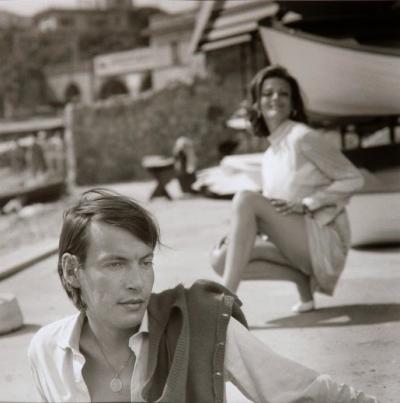
Dal blog Fabrizio De André in English
"De André wrote "Amico fragile" in a drunken rage after attending a party of rich Italians vacationing on Sardinia. They were only interested in having him play guitar and sing his songs, whereas De André wanted to engage people in discussions about events going on in Italy. He became ever more frustrated and inebriated with the shallowness of the evening, returning home to stay up all night and produce this "stream of semi-consciousness" rant. The song was a staple in his live shows and was one of De André's favorites." - Dennis Criteser
"De André wrote "Amico fragile" in a drunken rage after attending a party of rich Italians vacationing on Sardinia. They were only interested in having him play guitar and sing his songs, whereas De André wanted to engage people in discussions about events going on in Italy. He became ever more frustrated and inebriated with the shallowness of the evening, returning home to stay up all night and produce this "stream of semi-consciousness" rant. The song was a staple in his live shows and was one of De André's favorites." - Dennis Criteser
FRAGILE FRIEND
(continuer)
(continuer)
envoyé par Riccardo Venturi 9/2/2016 - 20:47
Andrea
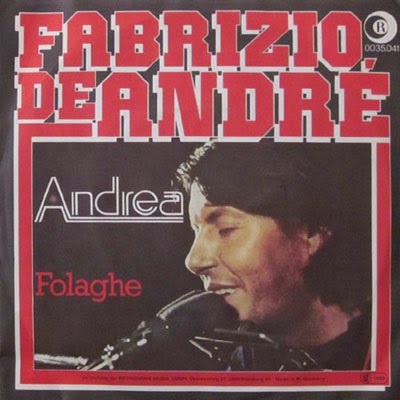
Dal blog Fabrizio De André in English
"Andrea" is both an anti-war song and a statement of solidarity with and acceptance of gays, as the song is about the love between two men (Andrea is a man's name in Italian). The setting for the song is World War I, which can be deduced because intense battles occurred on the ground in the mountains of Trent during WWI, whereas in WWII Trent suffered bombing from the air by the Germans toward the end of the war.
Rimini grew out of De André's disappointments with the political events of the previous couple of years. In close collaboration with Massimo Bubola, a young 24-year-old who had just released his first album, De André explored several social and political themes, including abortion, homosexuality, and how the petty bourgeois attempted to move into the ranks of the powerful and rise above the political and social turmoil of the times. The music... (continuer)
"Andrea" is both an anti-war song and a statement of solidarity with and acceptance of gays, as the song is about the love between two men (Andrea is a man's name in Italian). The setting for the song is World War I, which can be deduced because intense battles occurred on the ground in the mountains of Trent during WWI, whereas in WWII Trent suffered bombing from the air by the Germans toward the end of the war.
Rimini grew out of De André's disappointments with the political events of the previous couple of years. In close collaboration with Massimo Bubola, a young 24-year-old who had just released his first album, De André explored several social and political themes, including abortion, homosexuality, and how the petty bourgeois attempted to move into the ranks of the powerful and rise above the political and social turmoil of the times. The music... (continuer)
ANDREA
(continuer)
(continuer)
envoyé par Riccardo Venturi 9/2/2016 - 20:36
Canzone per l’estate
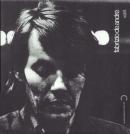
Dal blog Fabrizio De André in English
"The music of "Canzone per l'estate" is entirely De Gregori's, while the lyrics were co-written. De André described the song as somewhat autobiographical, describing the tension between the bourgeois life he grew up in and lived much of his life in, and his attraction to anarchism and to society's outcasts who seemed more genuine and alive than the upper classes. Indeed the song describes well the soul-sapping nature of a comfortable, prosperous life that takes one away from vitality and even political engagement ("your eyes closed to the people")." - Dennis Criteser
SONG FOR THE SUMMER
(continuer)
(continuer)
envoyé par Riccardo Venturi 9/2/2016 - 20:25
La cattiva strada

Dal blog Fabrizio De André in English
"Literally, "cattiva strada" means "bad road." But in a moral sense, if you're straying down the wrong path, going down a slippery slope or leading someone astray, you're on a "cattiva strada" and more than a paving crew will be needed. Author and De André expert Cesare Romana observed the following about "La cattiva strada": "The song is among the most illustrative of the philosophy of a great moralist disguised as an 'immoralist.' The bad road represents a pirate ethic, and also the free port where the powers-that-be don't come. Thus it comes to be defined as bad, yet holding these mainstream powers at a distance endows a force most subversive and revolutionary that can be placed at our disposition: love. The fact is that De André never moved far from the bad road. He continued to think that the humanity, love and dignity of man resided there, and... (continuer)
"Literally, "cattiva strada" means "bad road." But in a moral sense, if you're straying down the wrong path, going down a slippery slope or leading someone astray, you're on a "cattiva strada" and more than a paving crew will be needed. Author and De André expert Cesare Romana observed the following about "La cattiva strada": "The song is among the most illustrative of the philosophy of a great moralist disguised as an 'immoralist.' The bad road represents a pirate ethic, and also the free port where the powers-that-be don't come. Thus it comes to be defined as bad, yet holding these mainstream powers at a distance endows a force most subversive and revolutionary that can be placed at our disposition: love. The fact is that De André never moved far from the bad road. He continued to think that the humanity, love and dignity of man resided there, and... (continuer)
THE ERRANT WAY
(continuer)
(continuer)
envoyé par Riccardo Venturi 9/2/2016 - 18:41
C'era una volta
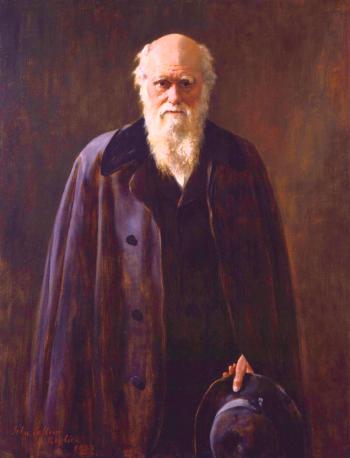
Chanson italienne – C'era una volta – Giorgio Laneve – 1976
Aux débuts des années '70, dans la vague « cantautorale » (chansonnière) italienne qui aura duré, plus ou moins, jusqu'à la fin de la décennie pour ensuite succomber (même musicalement) lors des années de strontium de la décennie suivante, Giorgio Laneve représenta une voix certes menue et polie, mais avec des traits d'originalité (et d'authentique poésie). Ingénieur électronique de formation, Giorgio Laneve commença fort jeune et, pendant une certaine période, il jouit même d'une certaine popularité, sans jouer des coudes (moi-même je me rappelle d'avoir vu une allusion à lui dans le journal de Mickey Mouse, je ne plaisante pas). En 1970, à 24 ans à peine, arriva à l'improviste en second au alors très célèbre « Disque pour l'été » avec Amore dove sei?Amour où es -tu ? , qui reste probablement sa chanson la plus célèbre. Il... (continuer)
Aux débuts des années '70, dans la vague « cantautorale » (chansonnière) italienne qui aura duré, plus ou moins, jusqu'à la fin de la décennie pour ensuite succomber (même musicalement) lors des années de strontium de la décennie suivante, Giorgio Laneve représenta une voix certes menue et polie, mais avec des traits d'originalité (et d'authentique poésie). Ingénieur électronique de formation, Giorgio Laneve commença fort jeune et, pendant une certaine période, il jouit même d'une certaine popularité, sans jouer des coudes (moi-même je me rappelle d'avoir vu une allusion à lui dans le journal de Mickey Mouse, je ne plaisante pas). En 1970, à 24 ans à peine, arriva à l'improviste en second au alors très célèbre « Disque pour l'été » avec Amore dove sei?Amour où es -tu ? , qui reste probablement sa chanson la plus célèbre. Il... (continuer)
IL ÉTAIT UNE FOIS
(continuer)
(continuer)
envoyé par Marco Valdo M.I. 9/2/2016 - 15:23
×
![]()

![Chacun de vous est concerné [incl. <em>Canzone del maggio</em> di Fabrizio De André]](img/thumb/c3706_130x140.jpeg?1328479274)
![Chacun de vous est concerné [incl. <em>Canzone del maggio</em> di Fabrizio De André]](img/upl/18025.jpg)



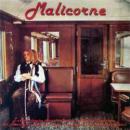
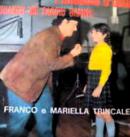



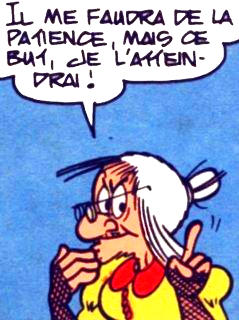
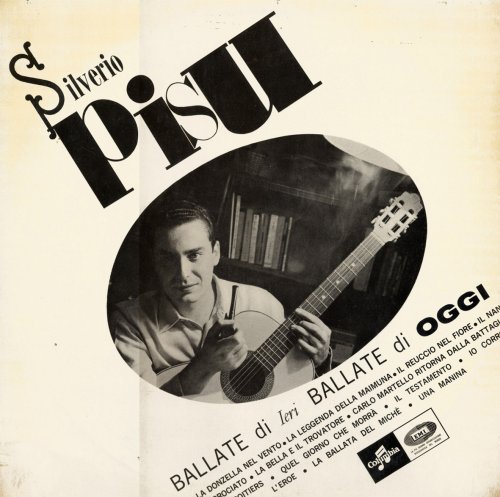
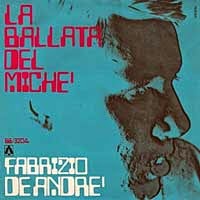

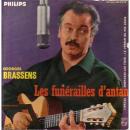
Difficilmente Peter Rowan canta tutte le strofe e tende ad alternare alcune di quelle centrali
La "City of Angels" della seconda strofa viene in genere sostituita con il nome del posto dove si trova a cantare, e il cowboy con una cowgirl.